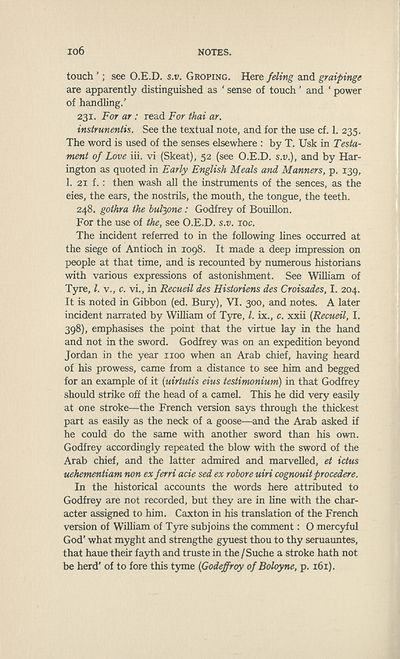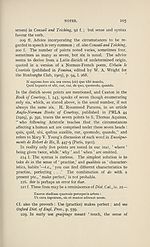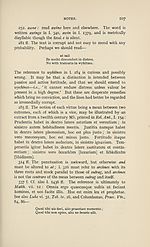Scottish Text Society publications > Third series > Ratis raving and other early Scots poems on morals
(194)
Download files
Complete book:
Individual page:
Thumbnail gallery: Grid view | List view

io6
NOTES.
touch ’; see O.E.D. s.v. Groping. Here feting and graipinge
are apparently distinguished as ' sense of touch ’ and ‘ power
of handling.’
231. For ar : read For thai ar.
instrunentis. See the textual note, and for the use cf. 1. 235.
The word is used of the senses elsewhere : by T. Usk in Testa¬
ment of Love iii. vi (Skeat), 52 (see O.E.D. s.v.), and by Har-
ington as quoted in Early English Meals and Manners, p. 139,
1. 21 f. : then wash all the instruments of the sences, as the
eies, the ears, the nostrils, the mouth, the tongue, the teeth.
248. gothra the butyone : Godfrey of Bouillon.
For the use of the, see O.E.D. s.v. 10c.
The incident referred to in the following lines occurred at
the siege of Antioch in 1098. It made a deep impression on
people at that time, and is recounted by numerous historians
with various expressions of astonishment. See William of
Tyre, l. v., c. vi., in Recueil des Historiens des Croisades, I. 204.
It is noted in Gibbon (ed. Bury), VI. 300, and notes. A later
incident narrated by William of Tyre, l. ix., c. xxii {Recueil, I.
398), emphasises the point that the virtue lay in the hand
and not in the sword. Godfrey was on an expedition beyond
Jordan in the year 1100 when an Arab chief, having heard
of his prowess, came from a distance to see him and begged
for an example of it (uirtutis eius testimonium) in that Godfrey
should strike off the head of a camel. This he did very easily
at one stroke—the French version says through the thickest
part as easily as the neck of a goose—and the Arab asked if
he could do the same with another sword than his own.
Godfrey accordingly repeated the blow with the sword of the
Arab chief, and the latter admired and marvelled, et ictus
uehementiam non ex ferri acie sed ex roboreuiri cognouit procedere.
In the historical accounts the words here attributed to
Godfrey are not recorded, but they are in line with the char¬
acter assigned to him. Caxton in his translation of the French
version of William of Tyre subjoins the comment: O mercyful
God’ what myght and strengthe gyuest thou to thy seruauntes,
that haue their fayth and truste in the /Suche a stroke hath not
be herd’ of to fore this tyme {Godeffroy of Boloyne, p. 161).
NOTES.
touch ’; see O.E.D. s.v. Groping. Here feting and graipinge
are apparently distinguished as ' sense of touch ’ and ‘ power
of handling.’
231. For ar : read For thai ar.
instrunentis. See the textual note, and for the use cf. 1. 235.
The word is used of the senses elsewhere : by T. Usk in Testa¬
ment of Love iii. vi (Skeat), 52 (see O.E.D. s.v.), and by Har-
ington as quoted in Early English Meals and Manners, p. 139,
1. 21 f. : then wash all the instruments of the sences, as the
eies, the ears, the nostrils, the mouth, the tongue, the teeth.
248. gothra the butyone : Godfrey of Bouillon.
For the use of the, see O.E.D. s.v. 10c.
The incident referred to in the following lines occurred at
the siege of Antioch in 1098. It made a deep impression on
people at that time, and is recounted by numerous historians
with various expressions of astonishment. See William of
Tyre, l. v., c. vi., in Recueil des Historiens des Croisades, I. 204.
It is noted in Gibbon (ed. Bury), VI. 300, and notes. A later
incident narrated by William of Tyre, l. ix., c. xxii {Recueil, I.
398), emphasises the point that the virtue lay in the hand
and not in the sword. Godfrey was on an expedition beyond
Jordan in the year 1100 when an Arab chief, having heard
of his prowess, came from a distance to see him and begged
for an example of it (uirtutis eius testimonium) in that Godfrey
should strike off the head of a camel. This he did very easily
at one stroke—the French version says through the thickest
part as easily as the neck of a goose—and the Arab asked if
he could do the same with another sword than his own.
Godfrey accordingly repeated the blow with the sword of the
Arab chief, and the latter admired and marvelled, et ictus
uehementiam non ex ferri acie sed ex roboreuiri cognouit procedere.
In the historical accounts the words here attributed to
Godfrey are not recorded, but they are in line with the char¬
acter assigned to him. Caxton in his translation of the French
version of William of Tyre subjoins the comment: O mercyful
God’ what myght and strengthe gyuest thou to thy seruauntes,
that haue their fayth and truste in the /Suche a stroke hath not
be herd’ of to fore this tyme {Godeffroy of Boloyne, p. 161).
Set display mode to: Large image | Zoom image | Transcription
Images and transcriptions on this page, including medium image downloads, may be used under the Creative Commons Attribution 4.0 International Licence unless otherwise stated. ![]()
| Publications by Scottish clubs > Scottish Text Society publications > Third series > Ratis raving and other early Scots poems on morals > (194) |
|---|
| Permanent URL | https://digital.nls.uk/106921669 |
|---|
| Description | A collection of over 100 Scottish texts dating from around 1400 to 1700. Most titles are in Scots, and include editions of poetry, drama, and prose by major Scottish writers such as John Barbour, William Dunbar, Gavin Douglas, and George Buchanan. Edited by a key scholarly publisher of Scotland's literary history, and published from the late 19th century onwards by the Scottish Text Society. Available here are STS series 1-3. |
|---|

